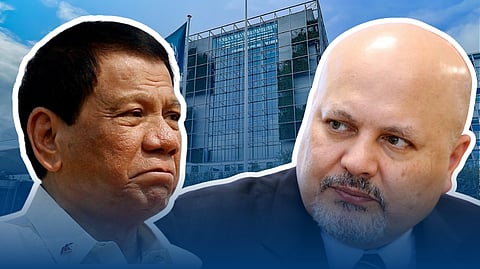
- NEWS
- the EDIT
- COMMENTARY
- BUSINESS
- LIFE
- SHOW
- ACTION
- GLOBAL GOALS
- SNAPS
- DYARYO TIRADA
- MORE

The legal team representing victims of the notorious bloody drug war under former President Rodrigo Duterte has urged the International Criminal Court (ICC) to dismiss Duterte’s appeal seeking to disqualify Chief Prosecutor Karim Khan over alleged impartiality.
In a submission dated 26 August, Principal Counsel Paolina Massida of the Office of Public Counsel for Victims asserted that the defense did not meet the “stringent requirements” under Article 42(7) of the Rome Statute, the ICC’s founding treaty, which outlines grounds for disqualification of a prosecutor.
The provision permits the disqualification of a prosecutor found to have been previously involved, in his/her private capacity, in the same case or a related one involving the same person being investigated or prosecuted.
Although Nicholas Kaufman, Duterte’s lead legal counsel, had already withdrawn their petition —claiming that there is “no ostensible reason” to doubt Khan’s impartiality, contradicting their prior accusations — the ICC Appeals Chamber has yet to render a decision on the matter.
Kuafman had earlier petitioned the court to immediately disqualify Khan from further handling Duterte’s case, citing his past link to victims of the “very same” drug-related killings in the Philippines involving Duterte.
He accused Khan of exploiting the information he had acquired as a victims’ counsel to prosecute the former president, leading to his arrest on 11 March in Manila on the ICC’s warrant.
One of the unique features of the ICC proceedings is that its prosecutor shall disclose both incriminating and exculpatory evidence against an accused.
Hence, Khan’s prior role in a similar case compromised the fairness of the present proceedings, Kaufman claimed.
Massida, in response, argued that aside from failing to meet the “high threshold” in proving the presumption of partiality, she dismissed the defense’s appeal as “moot” and “untimely.”
Citing ICC rules, she maintained that the Duterte camp should have filed for Khan’s disqualification at the earliest stage of the proceedings. The nearly five-month delay in the filing, she contended, shall be considered a waiver or a forfeiture of their right to a timely request for Khan’s disqualification.
“Hence, waiting for four months to file the request after gaining knowledge of the potential grounds of disqualification of the Prosecutor (especially after positively informing the Pre-Trial Chamber of his intention not to seek Mr. Khan’s disqualification) cannot possibly be considered as raising the matter with the Appeals Chamber at the earliest possible moment,” Massida’s submission read.
Moreover, she claimed that even if the defense succeeds in its efforts to disqualify Khan, it “will serve no practical purpose” given that the chief prosecutor is currently on a self-imposed leave due to allegations of sexual misconduct.
“Not only will such disqualification proceedings cause unnecessary distraction or erosion of confidence in the court as a whole among victims and the general public, but they will also waste precious time and resources of the Court. Therefore, on this ground alone, the request should be dismissed as moot,” the filing further stated.
Furthermore, the majority of the evidence to be presented against Duterte at the confirmation of charges hearing on 23 September does not include those obtained by Khan while he was still the counsel of drug war victims, according to Massida.
Thus, she said, “there is nothing else to suggest that he is not free to depart from previous, if any, factual findings which he has made in relation to that [REDACTED].”
“The disqualification of the prosecutor is not a step to be undertaken lightly, and a high threshold must be satisfied in order to rebut the presumption of impartiality… In the present circumstances, the defense’s allegations fall short of meeting this high threshold and thus should be rejected,” Massida concluded.
Khan has already denied being directly involved in the previous investigation related to drug war killings, claiming the review of the submissions against Duterte was handled by a team of lawyers within the Office of the Prosecutor, headed by a deputy prosecutor, not Khan himself.
Khan contended that prior involvement should not automatically disqualify a prosecutor, pointing to previous instances in which international tribunals appointed individuals who had taken part in earlier investigative proceedings.
Duterte, 80, is facing a single charge of murder for his role as an indirect co-perpetrator in the drug war killings waged by his administration, which saw thousands killed, mostly from poor communities.
He will remain detained at the Scheveningen Prison in The Hague, Netherlands, while awaiting the pre-trial hearing, unless the ICC grants his request for a temporary release.
Kaufman earlier told the tribunal that an undisclosed country has already agreed to host Duterte.
